Originally posted on December 25, 2023 @ 4:52 pm
Have you ever wondered how old the apples in your local grocery store really are? Despite their vibrant appearance, grocery store apples are not as fresh as they seem. In fact, they undergo a lengthy journey before reaching the produce section, with an average shelf life of 9-12 months.
When apples are picked, they are intentionally slightly unripe to withstand the transportation process. To maintain their firmness and prevent natural ripening, they are treated with a chemical called 1-methylcyclopropene. From there, they are placed in cold storage warehouses, where they can stay for months before being sold.
Table of Contents
Key Takeaways:
- Grocery store apples have an average shelf life of 9-12 months.
- They are picked when slightly unripe and treated with 1-methylcyclopropene to prolong their freshness.
- Apples are stored in cold storage warehouses for an extended period to maintain their firmness.
- The cold storage process can affect the flavor, texture, and nutrient content of apples.
- Consumers who prioritize freshness and quality should consider buying in-season, local apples.
The Cold Storage Process
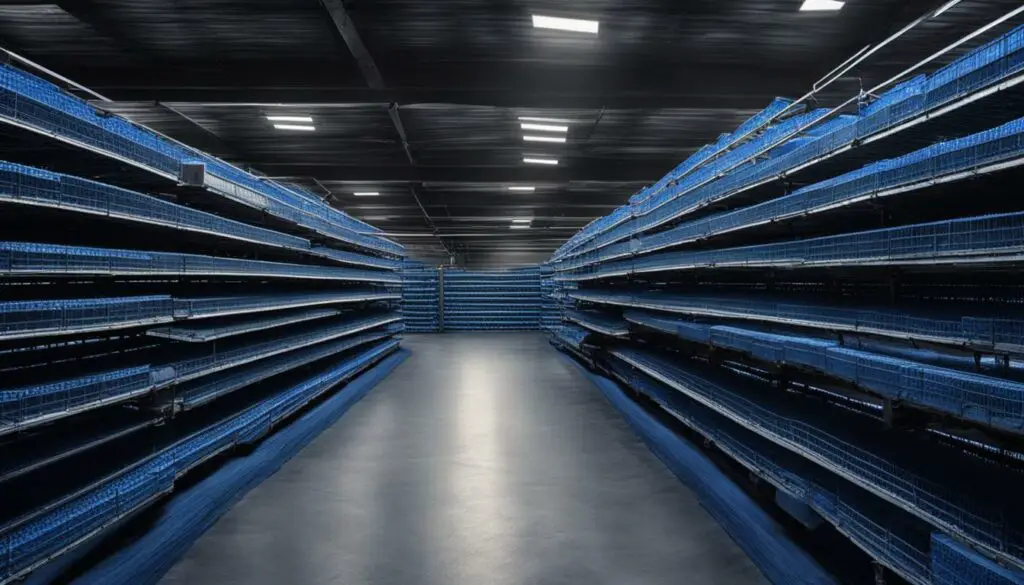
When it comes to preserving apples for extended periods, cold storage plays a crucial role. Apples that are not intended for the fresh market undergo a specialized storage process to ensure their availability year-round. This process involves storing the apples in warehouses with controlled temperatures, low oxygen levels, and high carbon dioxide levels.
The purpose of cold storage is to slow down the natural aging process of the apples, preserving their freshness and quality. By maintaining controlled environments, the storage process helps to prevent fungal rots and microbial growth, ensuring that the apples remain in good condition.
Additionally, the use of 1-methylcyclopropene (1-MCP) as a treatment has further extended the storage life of apples. 1-MCP inhibits the ethylene production in fruits, which is responsible for the ripening process. By reducing the levels of ethylene, the apples stay firm for several months longer while in cold storage.
The Aging Process in Cold Storage
During their time in cold storage, apples go through a unique aging process. The controlled environment helps maintain the apples’ quality, but over time, some changes occur. The aging process in cold storage can affect the flavor, texture, and nutritional content of the apples.
While the apples retain their crispness and visual appeal, their antioxidant activity gradually diminishes. Antioxidants are valuable compounds found in fresh produce that help support overall health and well-being. Therefore, it’s important to note that the longer apples are stored, the lower their antioxidant levels may become.
The Impact on Fresh Produce
The use of cold storage warehouses and the extended storage period can have implications for the overall freshness of produce. While the apples may still appear fresh, it’s essential to understand the effect of storage on their quality. Consumers who prioritize freshness and optimal nutrient content in their fruits should consider purchasing freshly harvested apples or those with a shorter storage period.
| Impact | Effect |
|---|---|
| Flavor | Gradual decrease in flavor intensity |
| Texture | Gradual softening and loss of crispness |
| Nutritional Value | Decrease in antioxidants and other nutrients |
Length of Cold Storage
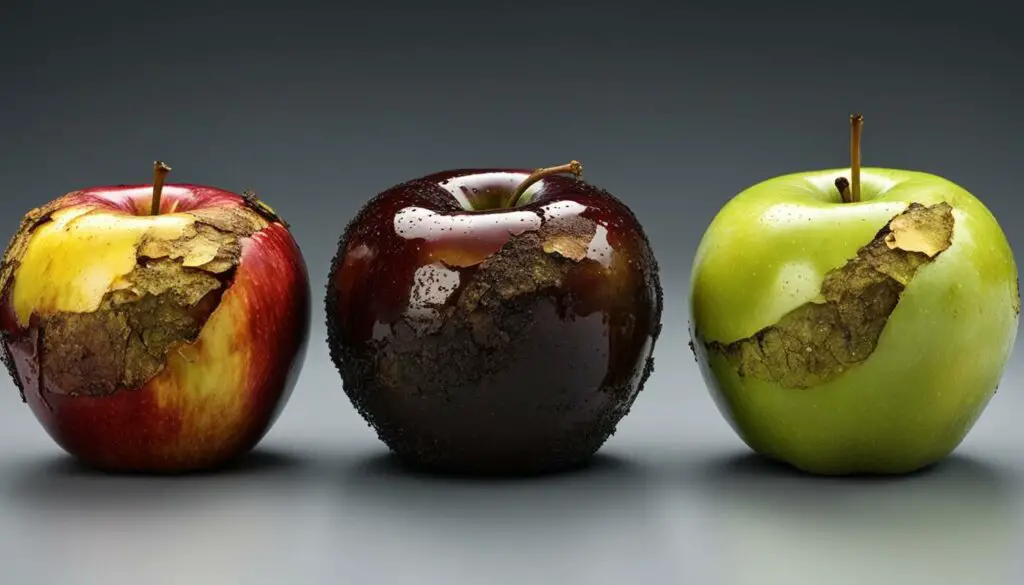
Cold storage plays a crucial role in extending the shelf life of apples. This section explores the average duration of cold storage for apples and the impact it has on their quality and freshness.
It is common for apples to undergo a storage period of 9-12 months before reaching grocery store shelves. In some cases, apples may even be stored for up to 12 months, earning them the industry nickname “birthday apples.” This extended storage duration allows for year-round availability of apples in supermarkets.
Testing conducted in Australia revealed that supermarket apples were approximately 9-10 months old by the time they reached consumers. This aging process highlights the significance of cold storage in ensuring apple availability throughout the year.
The Effects of Cold Storage Duration
The length of time apples spend in cold storage can impact their overall quality and freshness. As apples age during storage, their flavor, texture, and nutritional content may gradually diminish. This is due to the natural process of fruit ripening being slowed down in cold storage, which can affect the taste and texture of the apple when consumed.
Furthermore, the antioxidant activity of apples tends to decrease over time. A study comparing the antioxidant levels of freshly harvested apples to those that had undergone long-term cold storage found that the latter exhibited significantly lower antioxidant content. This decline in antioxidants is attributed to the aging process during cold storage.
While cold storage allows for the year-round availability of apples, it is important for consumers to be aware of the potential impact on freshness and nutritional value. When evaluating apple quality, considering factors such as the duration of cold storage can help make informed choices.
| Cold Storage Duration | Effects |
|---|---|
| 9-12 months | Diminished flavor and texture |
| Lower antioxidant content |
Impact on Apple Freshness

The extended period of cold storage can have a significant impact on the freshness of apples. As apples age in storage, their antioxidant activity, flavor, and texture gradually diminish. This decrease in freshness is attributed to the prolonged exposure to controlled temperatures and storage conditions.
Apples that have been stored for nearly a year can experience a notable decline in antioxidant levels compared to freshly harvested fruits. Antioxidants are essential for maintaining the overall health benefits associated with consuming apples, such as immune system support and disease prevention.
Furthermore, the overall nutritional value of apples decreases over time in storage. This can be attributed to the natural aging process of the fruit and the potential nutrient degradation that occurs during extended storage periods.
To emphasize the impact of cold storage on apple freshness, consider the following:
“Apples stored for nearly a year may have significantly lower levels of antioxidants compared to freshly harvested ones.”
The Effect on Flavor and Texture
In addition to the decline in antioxidants and nutritional value, apples stored for an extended period can also experience changes in flavor and texture. The prolonged storage can lead to a loss of crispness and juiciness, making the apples less desirable to consumers seeking a satisfying eating experience.
The natural ripening and aging process that occurs during storage alters the composition of the fruit, affecting its taste and mouthfeel. Consumers who prioritize the freshness and quality of their produce may find that apples stored for an extended period do not meet their expectations.
Here is a visual representation of the impact of cold storage on apple freshness:
| Aspect | Impact of Cold Storage |
|---|---|
| Antioxidant Levels | Decrease significantly |
| Nutritional Value | Declines over time |
| Flavor and Texture | Diminishes, leading to less desirable eating experience |
This image highlights the impact of extended cold storage on apple freshness, reinforcing the notion that apples stored for an extended period may not provide the optimal sensory experience and nutritional benefits that consumers desire.
With the understanding of how cold storage affects apple freshness, it is essential for grocery store quality control measures to prioritize minimizing the duration of storage to ensure customers can enjoy the best-tasting and most nutritious apples possible.
Consumer Expectations and Quality
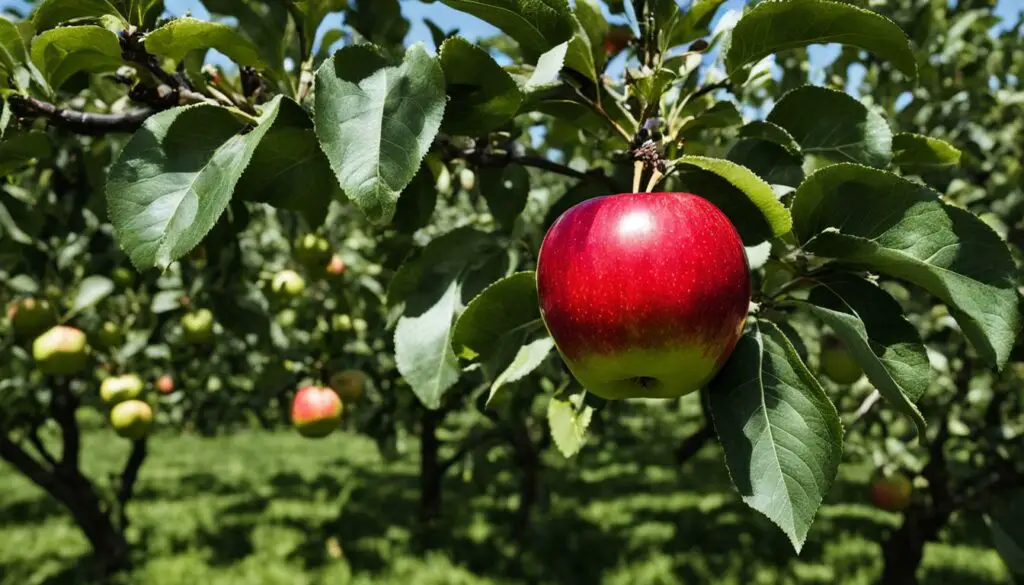
When it comes to fruits and vegetables, consumers have high expectations for freshness and quality. In fact, freshness is often a primary factor that influences their food choices. And when it comes to apples, sensory attributes such as taste, crispness, and juiciness play a significant role in their perception of freshness. Consumers prefer apples that are freshly harvested and have not undergone extensive storage.
Table: Factors Influencing Consumer Expectations and Preferences
| Factors | Impact on Consumer Expectations |
|---|---|
| Taste | Consumers expect apples to have a delicious and flavorful taste. Freshly harvested apples tend to have a more vibrant and satisfying taste compared to those that have been stored for a long time. |
| Crispness | The crispness of apples is highly valued by consumers. Freshly harvested apples have a satisfying crunch that is often associated with optimal freshness. |
| Juiciness | The juiciness of apples is an important sensory attribute for consumers. Apples that are freshly harvested tend to be more juicy and refreshing compared to those that have been stored for an extended period. |
Consumers understand the value of fresh produce, and they seek out apples that meet their expectations for quality and taste. They expect the highest standards when it comes to fruit quality, and understandably so. After all, fresh and flavorful fruits are not only more enjoyable to eat but also considered healthier due to their higher nutritional value.
“I always choose apples that are crisp and juicy. The taste is just so much better when they are freshly picked.” – Samantha, Apple Lover
Consumers’ preference for fresh produce, including apples, highlights the importance of meeting their expectations. To satisfy consumer demands, it is essential for producers and retailers to prioritize the delivery of high-quality, freshly harvested apples to the market.
With consumers becoming increasingly conscious about food choices and their health, meeting their expectations for fresh and high-quality produce is paramount for the success of any fruit-related business. By providing apples that are as fresh as possible, producers can enhance customer satisfaction and build customer loyalty.
Importance of Freshness for Nutrient Content
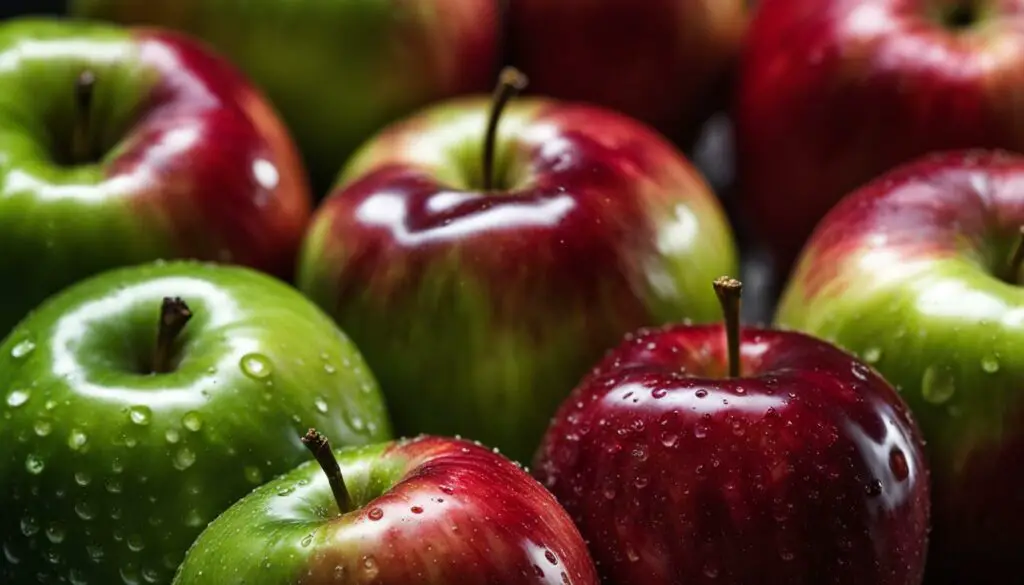
Freshness is not only important for flavor and texture but also for nutrient content. As apples age in storage, the levels of antioxidants and other nutrients gradually decrease. Apples stored for nearly a year may have significantly lower levels of antioxidants compared to freshly harvested ones. Therefore, consuming fresh apples is more beneficial for obtaining the maximum nutritional value.
When apples are freshly harvested, they contain a wide range of essential nutrients that contribute to good health. One particularly powerful group of nutrients found in apples is antioxidants. These compounds help to neutralize harmful free radicals in the body, reduce inflammation, and protect against chronic diseases such as heart disease and certain types of cancer. Apples also provide important vitamins and minerals, such as vitamin C, potassium, and dietary fiber.
However, as apples age in storage, their nutrient content gradually declines. Studies have shown that apples stored for extended periods can experience a significant reduction in antioxidant levels compared to freshly harvested apples. This is due to oxidation processes and degradation of important compounds during storage. While apples still provide nutritional value even after months in cold storage, they may not deliver the same high levels of antioxidants and other nutrients as their fresh counterparts.
If you are looking to optimize your nutrient intake, it is recommended to choose fresh, recently harvested apples. These apples are more likely to retain their antioxidant activity and other nutritional benefits. Additionally, consuming fresh apples supports local farmers and sustainable agriculture practices, as they are typically available during the harvest season.
In summary, while apples stored in cold storage are still a valuable source of nutrients, their freshness plays a crucial role in maintaining optimal nutrient content. By choosing fresh, recently harvested apples, you can ensure that you are getting the maximum nutritional value from this beloved fruit.
Tips for Optimal Freshness
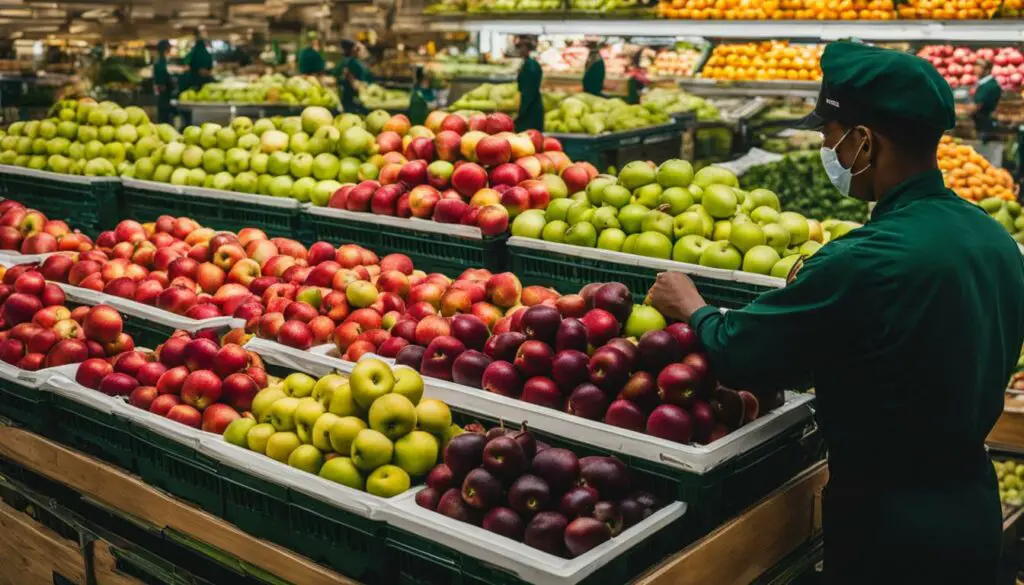
To ensure the freshest apples, it is recommended to buy them in season and from local farmers when possible. Picking fresh apples directly from the farm ensures that you are getting fruit that has been recently harvested, maximizing its freshness and flavor. When purchasing apples, choose ones that are firm, with no signs of bruising or browning. The firmness indicates that the apple is still crisp and has retained its moisture. Moreover, apples without any bruising or browning are less likely to have been mishandled or stored for an extended period.
Buying in season and from local farmers also supports the local economy and reduces the carbon footprint associated with long-distance transportation. By supporting local produce, you can enjoy apples that are grown in your region and may even have unique flavors and varieties specific to your area.
Storing apples at room temperature on the countertop can help maintain their freshness for a longer period. Although some might prefer to store apples in the refrigerator to prolong their shelf life, refrigeration can affect the texture and flavor of the fruit. Room temperature storage allows the apples to continue ripening naturally, providing a better eating experience.
It is also important to quickly consume or remove any bruised apples from the storage. Bruised apples release ethylene gas, a natural ripening agent that accelerates the spoiling process of other apples. By promptly addressing bruised apples, you can prevent spoilage and ensure that the rest of your apples stay fresh for a longer time.
“The key to enjoying the freshest apples is to pick them in season, buy local produce, and store them properly.” -Jane Appleseed
Table: Tips for Picking and Storing Fresh Apples
| Tips | Actions |
|---|---|
| Buy in season | Purchase apples during their peak season for the freshest taste and quality. |
| Support local farmers | Visit local farmers’ markets or farms to buy apples directly from the source. |
| Choose firm apples | Select apples that are firm, with no bruising or browning. |
| Store at room temperature | Keep apples at room temperature to maintain their flavor and texture. |
| Remove bruised apples | Quickly consume or discard any bruised apples to prevent spoilage. |
By following these tips, you can enjoy the freshest and most flavorful apples throughout the year. Remember, picking fresh apples and buying in season not only ensures optimal freshness but also supports local farmers and promotes sustainable food practices.
Organic Apples and Freshness
While buying organic apples may be associated with freshness and quality, it does not guarantee that the apples are freshly harvested. Organic growers still take measures to maintain the freshness of their apples, including the use of approved non-synthetic fungicides and controlled atmosphere cold storage.
“Organic growers prioritize sustainable and environmentally-friendly practices, but they also need to ensure that their apples remain fresh and appealing to consumers. To achieve this, they may implement techniques such as controlled atmosphere storage, which helps preserve the quality of the fruit over an extended period of time.”
Controlled atmosphere storage involves controlling the levels of oxygen, carbon dioxide, and temperature inside the storage facilities to slow down the natural ripening process of apples. This helps to maintain their crispness, flavor, and overall freshness for an extended period.
Despite the use of organic farming methods, organic apples can still undergo a period of storage, which may not align with the perception of freshly harvested produce. It’s important for consumers to consider factors beyond just the organic label when seeking the freshest apples.
Comparison Table: Freshness Factors of Organic and Conventionally Grown Apples
| Organic Apples | Conventionally Grown Apples | |
|---|---|---|
| Usage of Pesticides | Approved non-synthetic fungicides | Synthetic pesticides and fungicides |
| Cold Storage Duration | Controlled atmosphere storage to maintain freshness | Similar duration of cold storage |
| Harvesting Practices | May prioritize hand-picked apples for optimal ripeness | Mechanical harvesting of apples at a specific stage of ripeness |
| Overall Freshness | The freshness of organic apples can vary depending on storage practices | The freshness of conventionally grown apples can also vary depending on storage practices |
As seen in the comparison table, both organic and conventionally grown apples undergo a storage process to maintain their freshness. Therefore, it’s important for consumers to consider factors beyond just the organic label, such as buying local and in-season apples, to ensure the freshest produce.
Conclusion
In conclusion, it is important to recognize that grocery store apples may not be as fresh as they seem. The cold storage process, which involves treating the apples with 1-methylcyclopropene and storing them for extended periods, can affect their flavor, texture, and nutrient content. Therefore, consumers who prioritize apple freshness and nutritional value should consider alternative options.
One alternative is to buy in-season, local apples. By doing so, you can ensure that you are purchasing apples that have been recently harvested and have not undergone extensive storage. Local farmers’ markets are a great place to find fresh and flavorful apples that have not traveled long distances to reach your grocery store.
Another important tip is to consume the apples soon after purchase. This will help maximize their freshness and overall quality. By avoiding prolonged storage, you can enjoy apples that offer the crispness, juiciness, and flavor that is often associated with freshly harvested fruit.
Ultimately, understanding the process behind grocery store apples and making informed choices can help you prioritize apple freshness in your diet. By seeking out in-season, local apples and consuming them soon after purchase, you can ensure that you are enjoying apples at their peak freshness and getting the most out of their nutritional value.
FAQ
How old are apples in the grocery store?
Grocery store apples are typically stored in cold storage for 9-12 months before being sold.
What is the shelf life of apples?
Apples can be stored for an average of 9-12 months in cold storage before reaching grocery store shelves.
How does the cold storage process affect apples?
The cold storage process can impact the flavor, texture, and nutrient content of apples over time.
What is the impact of cold storage on apple freshness?
Apples stored for a long time in cold storage may have diminished freshness qualities such as taste, crispness, and juiciness.
What are consumer expectations regarding apple freshness?
Consumers prefer apples that are freshly harvested and have not been extensively stored.
How does the aging process of apples in cold storage affect their nutrient content?
As apples age in storage, the levels of antioxidants and other nutrients gradually decrease.
What are some tips for maintaining optimal apple freshness?
It is recommended to buy apples in season and from local farmers whenever possible. Storing them at room temperature can also help maintain their freshness.
Do organic apples guarantee freshness?
While buying organic apples may be associated with freshness and quality, it does not guarantee that the apples are freshly harvested.
What is the overall impact of cold storage on grocery store apples?
The cold storage process affects the freshness, flavor, texture, and nutrient content of grocery store apples, making freshly harvested apples a more desirable option for consumers.
Source Links
- https://www.smh.com.au/national/our-tests-show-supermarket-apples-are-up-to-10-months-old-20080120-gdrxiw.html
- https://www.foodrenegade.com/your-apples-year-old/
- https://www.sciencedirect.com/science/article/abs/pii/S0950329305000741
See also:
Leave a Reply